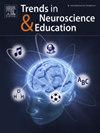Executive functions and key competencies in secondary education students. Can we improve the teaching-learning process?
IF 3
Q2 NEUROSCIENCES
引用次数: 0
Abstract
Executive functions play a crucial role in the social and academic development of students. This study aimed to examine the relations of students’ executive functions with their reading competence, mathematical competence, and social, emotional, and moral competencies. The sample was made up of 198 students (50.50 % girls, and 4 % did not report their sex) aged between 11 and 15 years (M = 12.53, SD = 1.08). This quantitative, cross-sectional ex-post-facto study was conducted using a self-report survey. Data were collected at the end of the 2018–2019 academic year. Bivariate Pearson correlations and linear regression analyses were performed. Students’ executive functions were positively related to their reading competence, mathematical competence, and social, emotional, and moral competencies. However, they only significantly predicted social and emotional competencies. The main conclusion of this study highlights the need to explicitly develop reading competence, mathematical competence, and social, emotional and moral competencies, considering the role of executive functions. Implications for the curriculum and school systems are debated.
中学教育学生的执行职能和关键能力。我们能改善教学过程吗?
执行功能在学生的社会和学业发展中起着至关重要的作用。本研究旨在探讨学生执行功能与阅读能力、数学能力、社会能力、情感能力和道德能力的关系。样本由198名11至15岁的学生(50.50%为女生,4%未报告性别)组成(M = 12.53, SD = 1.08)。这个定量的,横断面的事后研究是通过自我报告调查进行的。数据是在2018-2019学年结束时收集的。双变量Pearson相关和线性回归分析。学生的执行功能与其阅读能力、数学能力、社交能力、情感能力和道德能力呈正相关。然而,它们只能显著预测社交和情感能力。本研究的主要结论强调了考虑到执行功能的作用,明确发展阅读能力、数学能力、社会、情感和道德能力的必要性。对课程和学校系统的影响进行了辩论。
本文章由计算机程序翻译,如有差异,请以英文原文为准。
求助全文
约1分钟内获得全文
求助全文
来源期刊

Trends in Neuroscience and Education
NEUROSCIENCES-
CiteScore
6.30
自引率
6.10%
发文量
22
审稿时长
65 days
 求助内容:
求助内容: 应助结果提醒方式:
应助结果提醒方式:


